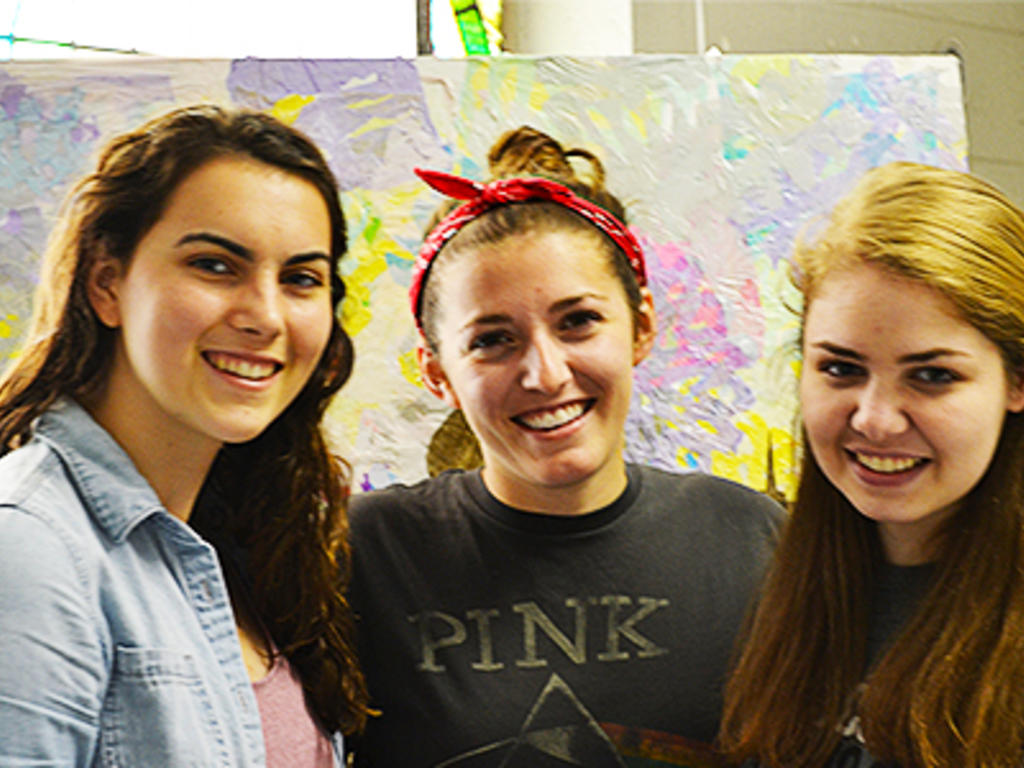By Katie Cannon ′15
If you can dream it, you can do it. Terribly trite it may be, but with the Center for the Outreach and Development of the Arts (CODA) at Rhodes, it’s a cliché come true. Though CODA mainly offers fellowships to incoming first-year and rising sophomore students devoted to the advancement of the arts, they also award funding to worthy projects from other students and faculty. For Olivia Knauss ’15, a CODA grant was an opportunity to engineer her own altruistic and artistic vision: a summer art camp for local refugee children. Olivia has enlisted fellow art majors Hannah Lewellen ’16, McKenzie Drake ’17, and Malerie McDowell ’17 as her co-counselors, and together they aim to inspire confidence and creativity in their young protégés through daily drawing, crafts, and group art projects.
The idea for the CODA proposal started with Olivia’s interest in the benefits of after school art programs for children. “It was just kind of a budding idea that grew into something else,” Olivia says. She was already a volunteer tutor with the Refugee Empowerment Program in Memphis when, after an afternoon of spontaneous sidewalk chalk art with the kids as they waited for the bus to arrive, Olivia realized that she had something personal to offer the community. Using her own skills in conjunction with the tools offered by CODA, she knew she could make it happen.
Olivia worked closely with Professor Erin Harmon, chair of the Department of Art, to craft her CODA grant request. As part of her proposal, Olivia wrote that she and the other student teachers “would introduce the campers to artists of different races and sexes so that they can see that anyone with the passion can do art; artists are not just old, crusty white men who live on for eternity in Gardner textbooks.”
The refugee children come from all over the world, forced to leave their homes and start a new life in completely foreign territory,where the ideas of “old, crusty white men” can seem ubiquitous. The art camp hopes to give the children a sense of pride in their own work and a chance to express themselves as unique individuals. Says rising junior Hannah, “You really just have to give them the opportunity to be creative, and they’ll run with it.”
The 4-week program is divided into two sessions: one two-week camp for elementary school children and another for middle school children, both building to a gallery show at Crosstown Arts on July 18. While the children do daily solo work in their sketchbooks, there’s also a lot of group collaboration for larger scale projects. One collaborative piece involved combining the artwork and the personal experiences of each child to make one large picture of the Memphis skyline. “It’s really interesting to pull all of their differences into one collective piece that is Memphis—because this is their new home,” Hannah adds. “It teaches them to work together and reconcile differences.”
Though the camp has been extremely rewarding for the Rhodes students, it certainly hasn’t been easy. “Even I didn’t realize how much planning would have to go into it,” says Olivia. But planning can’t account for everything in the unpredictable worlds of art, service, and childcare—often, it comes down to improvisation. According to rising sophomore McKenzie, the process has involved “a lot of trial and error of what worked and what didn’t, and just building on top of what was successful.”
Thus, it’s a learning experience as much as it is a teaching one. While Rhodes has prepared them for this amalgamation of service, leadership, and creativity, the fellows stress that the kids are professors as much as pupils when it comes to life lessons. “Their customs are so different from ours,” says McKenzie. “The kids take up so much leadership within their homes.”
“I sometimes kind of feel like a hypocrite,” Olivia adds. “Walking in and saying ‘Alright, I’m going to teach you this and teach you that,’ when they’re the ones teaching me, really.” This back and forth, this exchange of knowledge and ideas, defines the liberal arts experience for these students. The CODA grant has allowed these Rhodes students, much like their art camp pupils, to take their ideas and “run with them,” and given them the kind of chance at independence and personal growth that epitomizes the college experience.
But there’s another shared feeling between the students and teachers: pride in their accomplishments. According to Olivia, the kids ask all the time about the gallery show, wondering what will be displayed, wanting to show off all they’ve done and all they’ve learned. With the CODA grant, two generations of art students are finding their voices, fostering in them both creativity and the confidence to achieve their goals.
